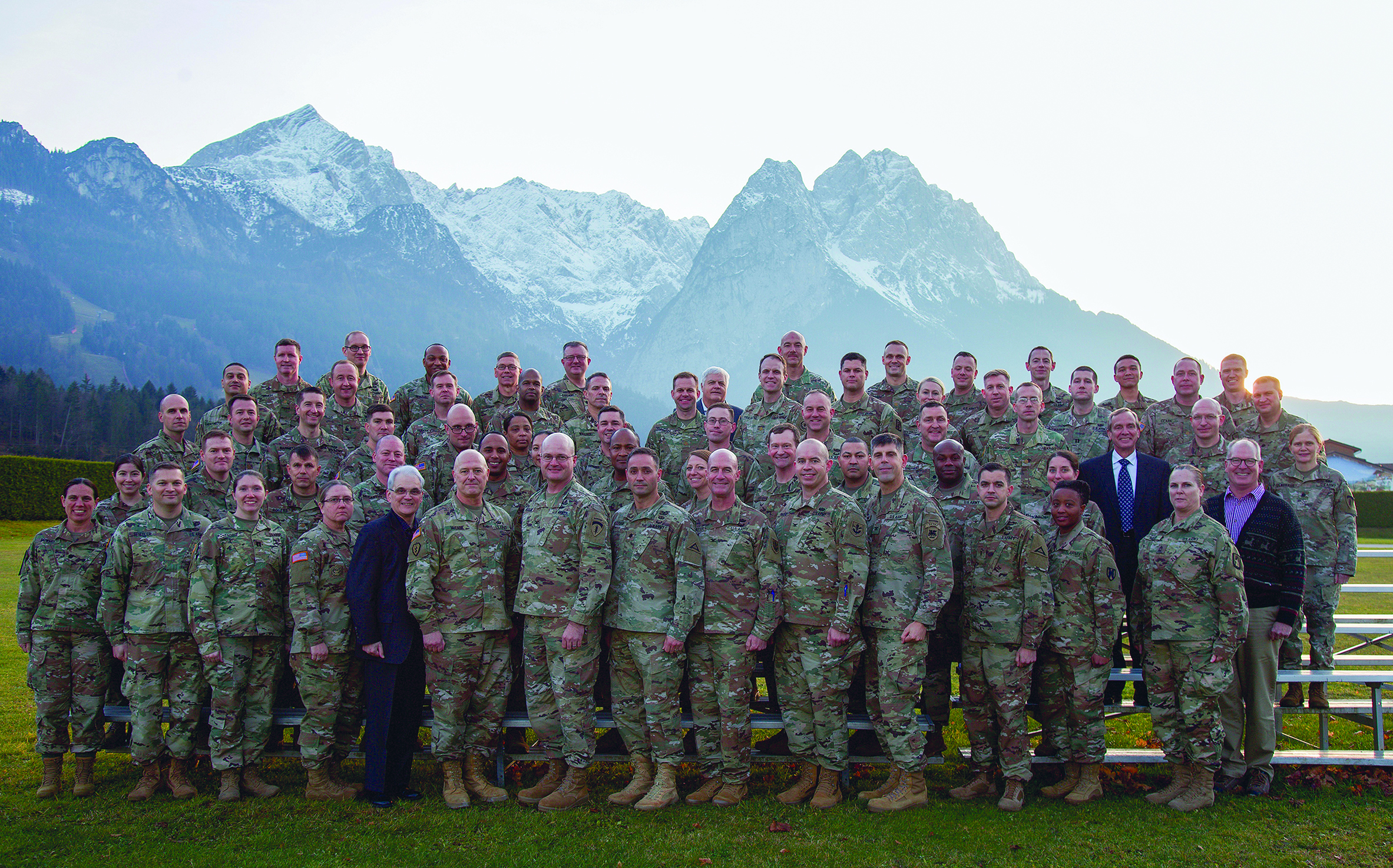
Attendees of the U.S. Army Europe Leaders’ Continuing Legal Education course in Germany pose for a group photo. (Courtesy: MAJ Jamie L. Gurtov)
Azimuth Check
U.S. Army Europe Legal Leadership Continuing Legal Education
By Major Jamie L. Gurtov
An Army leader is anyone who, by virtue of assumed role or assigned responsibility, inspires and influences people by providing purpose, direction, and motivation to accomplish the mission and improve the organization.1
Over 80,000 books on leadership,2 over 1,500 definitions of leadership,3 and over forty different distinctive leadership theories make studying and learning this topic a challenging task for military service members looking to improve and enhance their leadership skills. Everyone has a favorite book on leadership or a must-read. Engage in a discussion with your peers on leadership, and some common themes emerge on what makes a good leader and bad leader. Leadership and the importance of good leaders is widely recognized as a means of keeping employees happy and a reason people stay at their jobs. The Judge Advocate General’s (JAG) Corps is following the trend of fellow legal leadership scholars and practitioners through institutional thinking and education.
In June 2019, the Leadership Center was tasked with the mission of creating and implementing a strategy to develop JAG Corps leaders and teams. The Center supports Army and JAG Corps leadership education and training in order to develop JAG Corps leaders and teams so they are adaptive to any environment. From the start of the project, any current curriculum the Center developed would consider leaders’ experiences as a focus of the curriculum. As part of this training and education, the Leadership Center created an exportable and experiential training package, and it put through its proof of concept at the U.S. Army Europe Leaders Continuing Legal Education.
Experiential learning plays a key part in the development of the training module and balances doctrine, personalities, and experiences of participants. What issues do new and experienced leaders face that could play out in a scenario that all members of the JAG Corps might face? The Center focuses on ways to provide practical scenarios that integrate the leadership requirements model as a means of coaching and teaching. With teaching focused on leadership doctrine, the Center came up with common leadership challenges a JAG Corps leader would likely encounter, thereby developing scenarios to use as a teaching tool in an experiential learning model.

(Credit: istockphoto.com/z_wei)
The U.S. Army Europe Leaders’ Continuing Legal Education event tested this experiential learning model in November 2019. Using the scenarios developed at TJAGLCS, the Center was able to test the scenarios with an experienced, captive audience. Attendees were selected to play the roles created in the scenario. Those not actively playing a role were incorporated into the scenario by taking distinct breaks between issues to obtain feedback and ask questions. This provided the Center the ability to obtain instant feedback and identify best practices and refinements in the scenarios. The attendees were provided the briefest of background information to obtain the most realistic training possible. The other attendees observed and provided periodic feedback. The ability for the Center to observe the players and attendees provided a mechanism to identify ways to improve learning and foster growth.
All attendees actively participated in these scenarios, and there was a general feeling of interest in this new training. The scenario-based training is a tool to help emphasize the doctrine taught in the lectures and provide a meaningful albeit notional leadership experience. There was a special emphasis placed on facilitating discussion on leadership and involving officers, warrant officers, noncommissioned officers, and civilians. The goal is to make betters leaders, not just better attorneys and paralegals. The scenarios and training were said to be engaging and thought-provoking for the attendees. The intent of this program will be implemented in the current Graduate Course, future Officer Basic Courses, Judge Advocate Officer Advanced Course, as well as the Noncommissioned Officer Academy and short courses. The attendees provided valuable feedback for the Center to continue to hone the scenarios to develop better-equipped leaders through experiential learning.
The Leadership Center will continue to develop leadership education and training in order to evolve JAG Corps leaders and teams, making them more adaptive to any environment. This work will, in turn, benefit present and future leaders throughout the JAG Corps, and will close the gap in educational and experiential leadership. TAL
MAJ Gurtov is an associate professor in the Administrative Law Department at The Judge Advocate Legal Center and School in Charlottesville, Virginia.
Notes
1. U.S. Dep’t of Army, Doctrine Pub. 6-22, Army Leadership and the Profession para. 1-74 (31 July 2019) (C1, 25 Nov. 2019) [hereinafter ADP 6-22].
2. Deborah L. Rhode, Lawyers as Leaders 1 (2013).
3. Id. at 7.